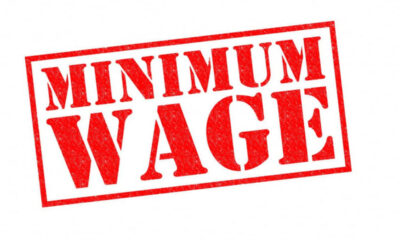Business
N’D Dev: Can Impact Assessment Help?
On the back cover of Dr. Bristol-Alagbariya’s book, Participation in Petroleum Development, I say:
The potential of impact assessment for bringing “equity, prosperity, and tranquility” to the Niger Delta, especially by means of community participation, offers a promising approach to achieving sustainable development in that volatile yet vital part of the world.
Approaches are not arrivals, however. The precondition for this or any other initiative to succeed depends in the first instance on peaceful resolution of the violent confrontation that has afflicted the region and nation with growing intensity over the past five years. Its roots go much deeper, of course, to the disparity and inequity that have marked and marred the region since oil development began in 1956.
The Primacy of Politics
It was here in Abuja, four and a half years ago, in a meeting at the Ministry of Agriculture and Water Resources, that it occurred to me: “Water resources development is one-tenth technical and nine-tenths political.”
I repeated that insight at an International Water Association conference last month in Seoul, Korea, and asked the audience of mainly technical people if that were about the right fraction. No one disagreed.
Earlier this month I repeated it again, this time in Melbourne, Australia, in discussions with one of the largest mining companies in the world, and again there was no disagreement. In fact, I have yet to meet anyone who disagrees with that formulation.
If this is so, then it follows that “to get the water resources right, you have to get the politics right.” What that might mean naturally depends on what is understood as “politics.” Two leading but contending versions are the coercion and consensus views.
The former is represented by Harold W. Lasswell, who defined “politics” as “who get what, where, when, and how.” In fact, identifying winners and losers is a fair description of the methodology of impact assessment. In contrast, David C. McClelland offers a consensual definition of politics, one more congenial to the author’s: politics is “the authoritative allocation of values.”
Whatever definition we adopt, getting the politics right means building the institutional capacity for good governance. The United Nations Development Programme have postulated five principles for achieving this:
The operative terms here all relate closely to the concept of public or popular or people’s participation, the central theme of the book under discussion. Its centrality in the process of social change is embodied in Herbert Simon’s “Participation Hypothesis”:
“ … Significant changes in human behavior can be brought about rapidly only if the persons who are expected to change, participate in deciding what the change shall be and how it shall be made.” (from “Recent Advances in Organization Theory” (1955: p. 206).
Enter Impact Assessment’
We can now assert that the field of Impact assessment represents both an instrument of governance (see Ahmed and Sanchez-Triana 2008) and an opportunity for participation. It is therefore not surprising to find the author with affiliations in both fields. “Impact assessment” can be formally defined as:
. .. a process for anticipating and evaluating the difference between existing and future conditions with and without the intervention of natural events or social actions, intended or unintended.
What it is good for is contained in this vision/mission statement: the goal of impact assessment is to:
… develop local and global capacity to anticipate, plan, and manage the consequences of change so as to enhance the quality of life for all.
The general methodology of impact assessment is comprised in ten steps, referred to here as the “Main Pattern” schema since it appears to represent a general consensus among impact assessment practitioners and aims at methodological completeness. The ten steps comprising an assessment cycle are:
Scoping
Problem Identification
Formulation of Alternatives
Profiling
Projection
Analysis of Alternatives
Evaluation
Mitigation
Monitoring
Management
Specific methods and techniques and data sets and series are associated with analytic operations at each step. Opportunities for participation are likewise present at every step, especially scoping, problem identification, and formulation of alternatives on the front end and evaluation, monitoring, and management on the back.
In short, impact assessment seeks the (fore) knowledge of consequences, anticipating unanticipated consequences by exercising the foresight provision. Along with this goes an ethic of consequences, emphasizing the responsibility of impact assessment practitioners in relation to their knowledge and its application.
Two phrase can be applied in characterising the field of impact assessment: “comprehensive and integrated” in its coverage of impact levels, scales, schedules, and sectors, and “proactive and creative” in its anticipatory research, design, and policy applications. In this it supports futurist Alvin Toffler’s concept of “anticipatory democracy,” putting people in charge of their own desirable futures. In the present context, it is convergent with the author’s view of “environmental democracy.”
We believe that application of the philosophy and methodology of impact assessment can and will serve to facilitate bringing “equity, prosperity, and tranquility” to the Niger Delta region and to the nation and beyond. This book marks an important advance toward that end.
Prof. C. P. Wolf of the Social Impact Assessment Centre, New York and also co-founder and Past President International Association for Impact Assessment (IAIA), Fargo, USA presented this paper at the launching of the book “Participation in Petroleum Development: Towards Sustainable Community Development in the Niger Delta” written by Aseme-Alabo Edard T. Bristol-Alagbariya at Transcorp Hilton, Abuja, recently.
Prof. C. P. Wolf
Maritime
Shippers’ Council Registers 160 Port Operators

The Nigerian Shippers Council (NSC) says it has registered 160 Port stakeholders into its Regulated Port Service Provider and Users platform since the initiative began in 2023.
Executive Secretary, NSC, Mr Pius Akutah, made the disclosure on the sideline of a sensitisation programme by the commission for port operators in Lagos, with the theme, “Regulated Port Service Provider and Users”.
Represented by the Director, Consumer Affairs, Chief Cajetan Agu, Akutah emphasised the significance of the programme for stakeholders.
He said the sensitisation programme was the second edition after its commencement during the last quarter of 2023.
The Secretary said the 160 registered port operators consist of agencies, terminal operators, shipping companies, individual port users as well as service providers.
“We invited the ports stakeholders for enlightening them on the processes for online registration of Regulated Port Service Provider and Users.
“We have demonstrated to them how to register and how to make payment and we were able to present before them the various categories of the registration.
“The rate of payment is also in the registration. The payment of each group depends on the operation. A shipper pays N30,000, terminal operators and shipping companies pay N300,000, truckers also pay N30,000, while some pay N50,000 and N100,000.
“The Council was able to intimate them on the benefits, because port users benefit more as we help to interface on reducing port charges from time to time”, Akutah said.
He said that there was a need to continue to work with port operators to stop delays and eliminate high costs to make the port efficient.
Also speaking, the Deputy Director, Stakeholders, Service, NSC, Mr Celestine Akujobi, said “the sensitisation exercise was important for the council to enable us bring all the port stakeholders together”.
According to him, this is to avoid challenges during the implementation of the council’s responsibilities.
“By the time we introduce sanctions on defaulters, no operators will complain that he or she is not aware of the registration.
“I’m happy with the turnout of this sensitisation. This shows that the operators are well informed of the statutory friction of the council as the port regulator.
“The final implementation will commence as soon as we discover that all the operators have keyed into the portal.
“We are engaging other ports across the country and we’re hopeful that before the last quater of 2024, the council will implement sanctions on defaulting operators”, Akujobi said.
Earlier, Vice Chairman, National Association of Government Approved Freight Forwards (NAGAFF), Dr Ifeanyi Emoh, said port challenges were enormous, adding that they originated from some of the government agencies.
Emoh urged the council to look into regulating other government agencies, so that there could be a window through which they can collect port charges collectively instead of indiscriminately.
By: Chinedu Wosu
Business
Chivita, Hollandia Reward Outstanding Trade Partners At Annual Conference

Chivita| Hollandia (CHI Limited) leading fruit juice and value-added dairy manufacturer in Nigeria has rewarded its long standing distributors at the recently held 2024 Distributor Conference. The event with the theme, “Break Boundaries Exceed Expectations” served as a platform to recognise and reward the exceptional contribution of the distributors and wholesalers who play a critical role in Chivita|Hollandia (CHI Limited) success and business goals for the year.
The Distributor Conference was held in two sessions. While the morning session featured keynote addresses, industry insights and brand immersion experience, the evening session was a cultural display of elegance and funfair that culminated in the award presentation and recognition of the contribution the trade partners made to the company in the 2023 year under review.
A key highlight of the event was the award ceremony which acknowledged outstanding trade partners in various regions across the country. The awards recognized commitment, dedication, and outstanding performance in areas of sales growth, brand promotion, and market expansion.
Eelco Weber, Managing Director, Chivita|Hollandia (CHI Limited), stated that the company’s success story is incomplete without the strong partnerships it has built with trade partners. “Today, we celebrate not only the achievements, but the collaborative spirit that has made our growth possible” he said.
Bola Arotiowa, Chief Commercial Officer, Chivita|Hollandia (CHI Limited), in his statement revealed that, the event which was first of its kind will continue to be an annual meeting to enable the company work more closely with its distributors, share insights and action points, help the trade partners familiarize themselves with the company’s goals and objectives for each year, and serve as a driver for mutual success.
“Our distributors are the backbone of Chivita|Hollandia (CHI Limited). Their relentless efforts in distributing our products, promoting our brands, and expanding our reach across the nation is truly commendable. As the bridge between us and our valued consumers, it is very important to reward their hard work and dedication for being an essential part of the Chivita|Hollandia (CHI Limited) family. Together, we will continue to deliver great products to our conusmers which in turn will deliver value to them”, Mr. Arotiowa added.
Speaking at the conference, HajiyaBilikisuSaida, Chief Executive Officer of Smabirm Nigeria Limited, who won the Outstanding Distributor of the Year in North 1 region, and got a reward of two million Naira worth of Chivita|Hollandia (CHI Limited) products expressed delight at the company’s recognition, and stated that the awards served as a way to inspire distributors to do more and put in more effort, which in turn would help both the distributors and the company to grow.
Other outstanding performance distributors of the year rewarded with a two million Naira worth of Chivita|Hollandia (CHI Limited) stock include, Sunny Chuks Limited for East 1 region, MRS FA & Sons Limited for East 2 region, Hussakas Ventures for North 2 region, Rookee 1388 Ventures for Lagos 1 region, Pik N Pil Ventures for Lagos 2 region, FaithJoe Event Management Limited for West 1 region, and Progress Family Nigeria Enterprise for West 2 region.
The annual Distributors Conference aims to strengthen the bond between Chivita|Hollandia (CHI Limited) and its trade partners. This collaborative approach fosters mutual growth and ensures the continued success of the brands in the Nigerian market.
Business
AXA Mansard Backs Female-Owned MSMEs With N1.4m Grant

A global leader in insurance and asset management, AXA Mansard, has supported three female-owned MSMEs with business grants totaling 1.4 million to boost their operations.
This, the company said, is part of its commitment to women and the Medium, Small, and Medium-scale Enterprise (MSME) sector in the country.
The three businesses were successful at the International Women’s Day Pitch Competition, organised in partnership with SME 100 Africa in Lagos.
According to the Head of Marketing, AXA Mansard, Olusesan Ogunyooye, the competition, which is aimed at supporting female entrepreneurs in Nigeria, “is another way AXA is demonstrating its commitment to the causes of women and stimulating the MSME sector in Nigeria”.
The business pitch competition received numerous entries from women across different sectors, but after a rigorous selection process, shortlisted participants were selected to participate in the competition.
Ogunyooye said “the programme provided a unique opportunity for women from various works and socio-economic classes to showcase their innovative ideas and solutions in sectors such as food, tech, fashion, and fragrance, creating an atmosphere filled with excitement, enthusiasm, and a strong sense of community”.
He stressed the importance of investing in women, saying it is not just the right thing to do, but also aligns with AXA’s purpose of acting for human progress.
He explained that AXA believes the future of women should not be at risk, hence investing in their economic empowerment is a crucial part
-

 News3 days ago
News3 days ago82nd Birthday: Odu Eulogises King Dandeson Jaja
-

 Politics3 days ago
Politics3 days agoJonathan Mourns, Ex-Senate Spokesperson, Ayogu Eze
-

 Rivers3 days ago
Rivers3 days agoFour Dead, 70 Vehicles Burnt In Fuel Tanker Explosion In Rivers
-

 Education3 days ago
Education3 days agoDon Seeks 20%Increased Budget Allocation To Education
-

 Business3 days ago
Business3 days agoAXA Mansard Backs Female-Owned MSMEs With N1.4m Grant
-

 Editorial3 days ago
Editorial3 days agoTowards Minimum Wage Implementation
-

 Nation3 days ago
Nation3 days agoSDP National Chairman Lauds FG’s Efforts To Tackle Insecurity
-

 Breaking News3 days ago
Breaking News3 days agoTanker Inferno: We’re Saddened By Extent Of Carnage -Fubara

